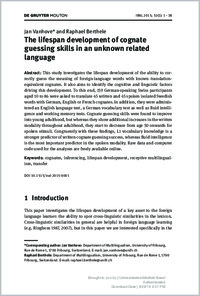The lifespan development of cognate guessing skills in an unknown related language
BLE-BLL
- Vanhove, Jan University of Fribourg
- Berthele, Raphael University of Fribourg
-
2015
Published in:
- International Review of Applied Linguistics in Language Teaching. - 2015, vol. 53, no. 1, p. 1-38
English
This study investigates the lifespan development of the ability to correctly guess the meaning of foreign-language words with known translation-equivalent cognates. It also aims to identify the cognitive and linguistic factors driving this development. To this end, 159 German-speaking Swiss participants aged 10 to 86 were asked to translate 45 written and 45 spoken isolated Swedish words with German, English or French cognates. In addition, they were administered an English language test, a German vocabulary test as well as fluid intelligence and working memory tests. Cognate guessing skills were found to improve into young adulthood, but whereas they show additional increases in the written modality throughout adulthood, they start to decrease from age 50 onwards for spoken stimuli. Congruently with these findings, L1 vocabulary knowledge is a stronger predictor of written cognate guessing success, whereas fluid intelligence is the most important predictor in the spoken modality. Raw data and computer code used for the analyses are freely available online.
- Faculty
- Faculté des lettres et des sciences humaines
- Department
- Département de plurilinguisme et didactique des langues étrangères
- Language
-
- English
- Classification
- Language, linguistics
- License
-
License undefined
- Identifiers
-
- RERO DOC 308927
- DOI 10.1515/iral-2015-0001
- Persistent URL
- https://folia.unifr.ch/unifr/documents/306850
Statistics
Document views: 136
File downloads:
- Document: 205
